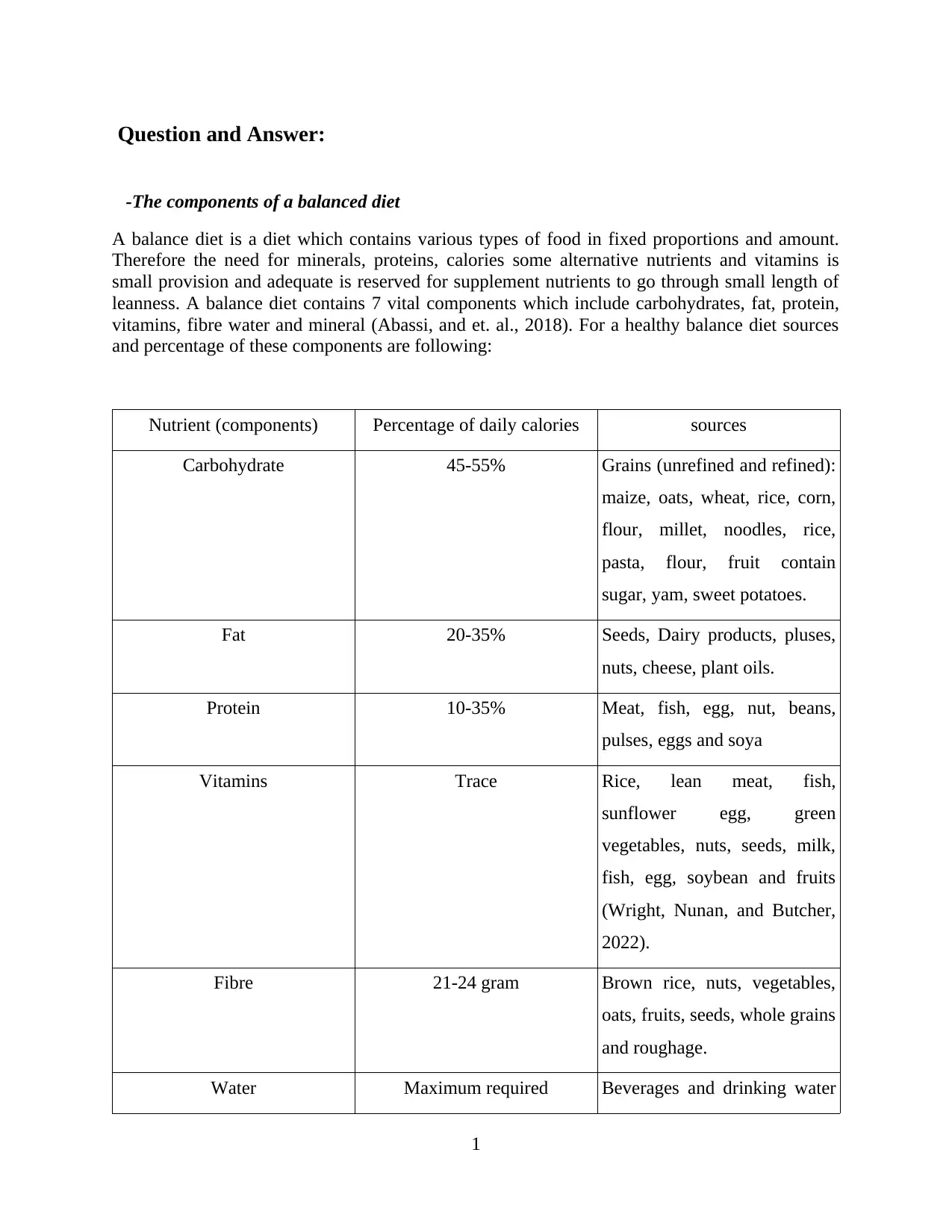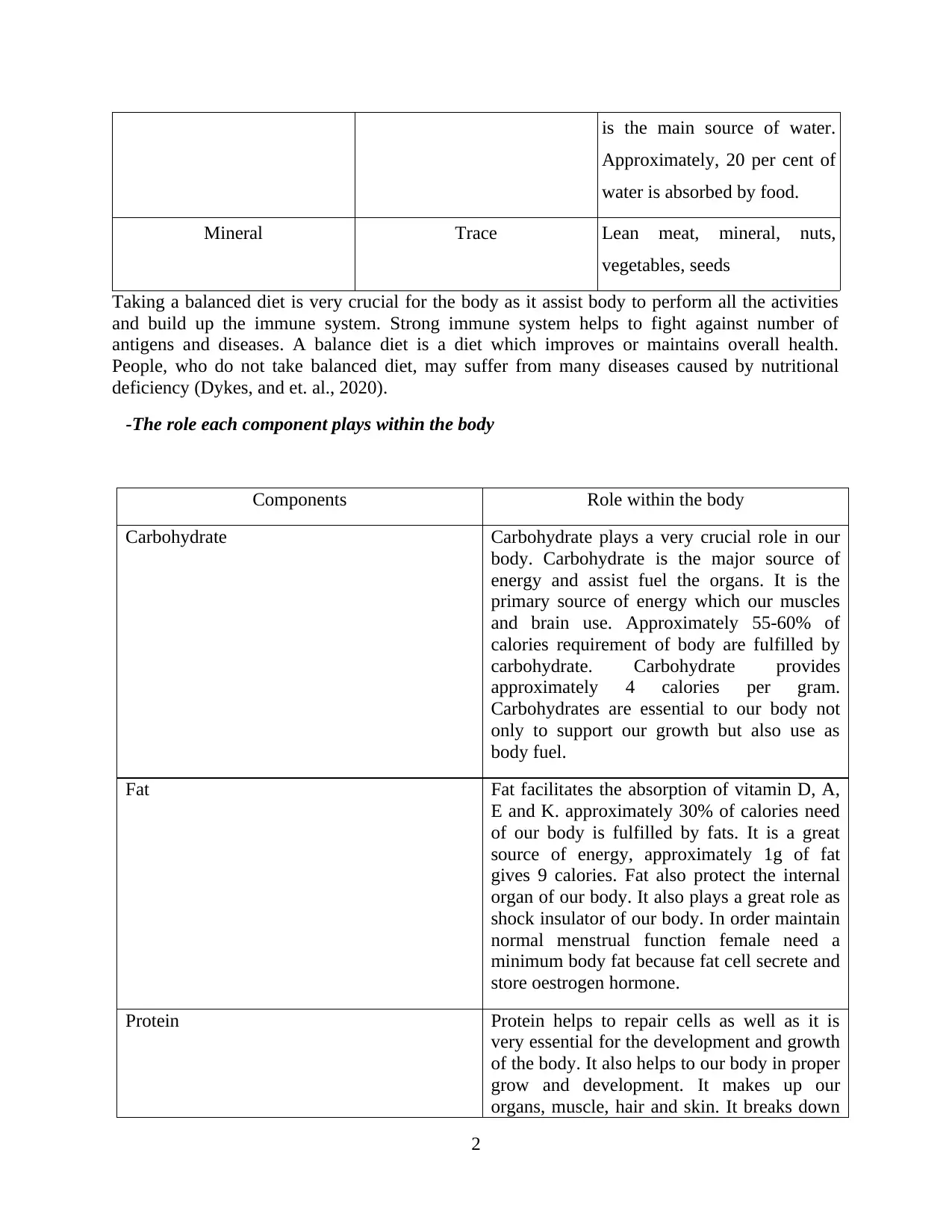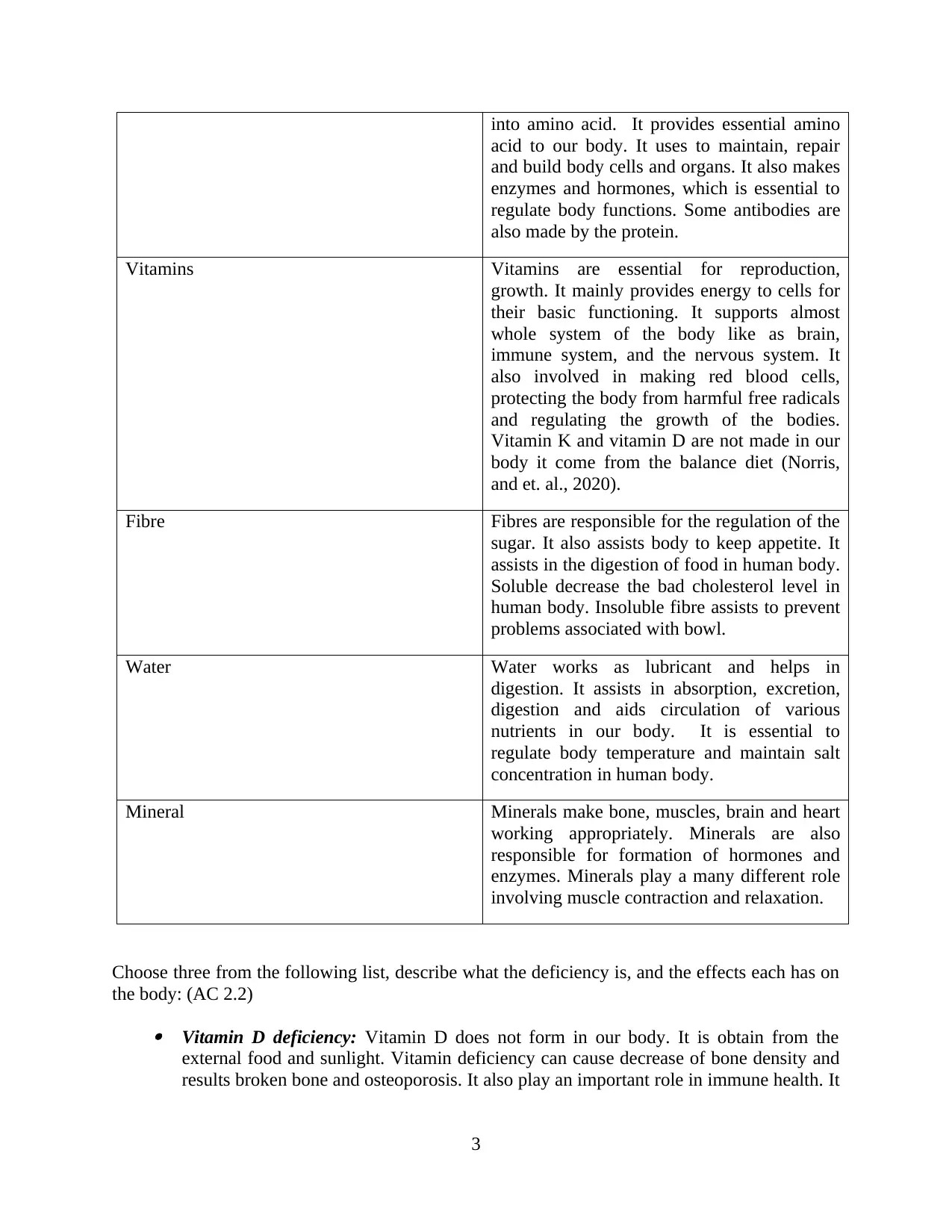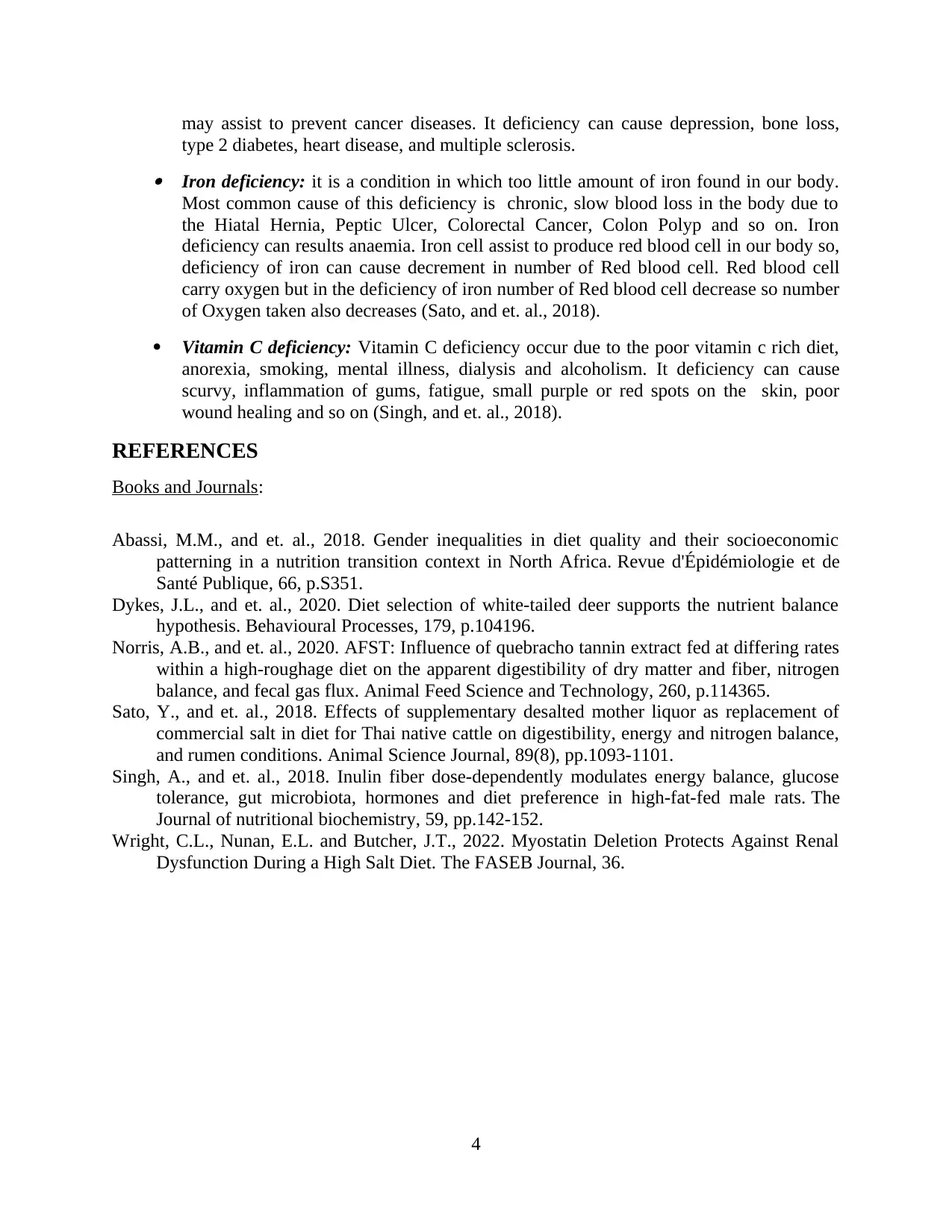Components of a Balanced Diet, Roles, and Deficiency Effects Report
VerifiedAdded on 2023/06/07
|6
|1432
|94
Report
AI Summary
This report provides a comprehensive overview of a balanced diet, detailing its essential components: carbohydrates, fats, proteins, vitamins, fiber, water, and minerals. It outlines the sources and optimal percentages of these nutrients, emphasizing their crucial roles in maintaining bodily functions, such as energy provision, cell repair, and immune system support. The report further explores the consequences of nutritional deficiencies, focusing on Vitamin D, Iron, and Vitamin C, describing the health issues associated with each deficiency, including bone density loss, anemia, and scurvy, respectively. Additionally, the report references various academic sources to support its findings, offering a well-rounded analysis of the importance of a balanced diet for overall health and well-being. This is a great resource for anyone studying nutrition and wellness.

Task 25 A Balance Diet
Paraphrase This Document
Need a fresh take? Get an instant paraphrase of this document with our AI Paraphraser

Contents
Contents...........................................................................................................................................2
INTRODUCTION...........................................................................................................................1
REFERENCES................................................................................................................................1
Contents...........................................................................................................................................2
INTRODUCTION...........................................................................................................................1
REFERENCES................................................................................................................................1

Question and Answer:
-The components of a balanced diet
A balance diet is a diet which contains various types of food in fixed proportions and amount.
Therefore the need for minerals, proteins, calories some alternative nutrients and vitamins is
small provision and adequate is reserved for supplement nutrients to go through small length of
leanness. A balance diet contains 7 vital components which include carbohydrates, fat, protein,
vitamins, fibre water and mineral (Abassi, and et. al., 2018). For a healthy balance diet sources
and percentage of these components are following:
Nutrient (components) Percentage of daily calories sources
Carbohydrate 45-55% Grains (unrefined and refined):
maize, oats, wheat, rice, corn,
flour, millet, noodles, rice,
pasta, flour, fruit contain
sugar, yam, sweet potatoes.
Fat 20-35% Seeds, Dairy products, pluses,
nuts, cheese, plant oils.
Protein 10-35% Meat, fish, egg, nut, beans,
pulses, eggs and soya
Vitamins Trace Rice, lean meat, fish,
sunflower egg, green
vegetables, nuts, seeds, milk,
fish, egg, soybean and fruits
(Wright, Nunan, and Butcher,
2022).
Fibre 21-24 gram Brown rice, nuts, vegetables,
oats, fruits, seeds, whole grains
and roughage.
Water Maximum required Beverages and drinking water
1
-The components of a balanced diet
A balance diet is a diet which contains various types of food in fixed proportions and amount.
Therefore the need for minerals, proteins, calories some alternative nutrients and vitamins is
small provision and adequate is reserved for supplement nutrients to go through small length of
leanness. A balance diet contains 7 vital components which include carbohydrates, fat, protein,
vitamins, fibre water and mineral (Abassi, and et. al., 2018). For a healthy balance diet sources
and percentage of these components are following:
Nutrient (components) Percentage of daily calories sources
Carbohydrate 45-55% Grains (unrefined and refined):
maize, oats, wheat, rice, corn,
flour, millet, noodles, rice,
pasta, flour, fruit contain
sugar, yam, sweet potatoes.
Fat 20-35% Seeds, Dairy products, pluses,
nuts, cheese, plant oils.
Protein 10-35% Meat, fish, egg, nut, beans,
pulses, eggs and soya
Vitamins Trace Rice, lean meat, fish,
sunflower egg, green
vegetables, nuts, seeds, milk,
fish, egg, soybean and fruits
(Wright, Nunan, and Butcher,
2022).
Fibre 21-24 gram Brown rice, nuts, vegetables,
oats, fruits, seeds, whole grains
and roughage.
Water Maximum required Beverages and drinking water
1
⊘ This is a preview!⊘
Do you want full access?
Subscribe today to unlock all pages.

Trusted by 1+ million students worldwide

is the main source of water.
Approximately, 20 per cent of
water is absorbed by food.
Mineral Trace Lean meat, mineral, nuts,
vegetables, seeds
Taking a balanced diet is very crucial for the body as it assist body to perform all the activities
and build up the immune system. Strong immune system helps to fight against number of
antigens and diseases. A balance diet is a diet which improves or maintains overall health.
People, who do not take balanced diet, may suffer from many diseases caused by nutritional
deficiency (Dykes, and et. al., 2020).
-The role each component plays within the body
Components Role within the body
Carbohydrate Carbohydrate plays a very crucial role in our
body. Carbohydrate is the major source of
energy and assist fuel the organs. It is the
primary source of energy which our muscles
and brain use. Approximately 55-60% of
calories requirement of body are fulfilled by
carbohydrate. Carbohydrate provides
approximately 4 calories per gram.
Carbohydrates are essential to our body not
only to support our growth but also use as
body fuel.
Fat Fat facilitates the absorption of vitamin D, A,
E and K. approximately 30% of calories need
of our body is fulfilled by fats. It is a great
source of energy, approximately 1g of fat
gives 9 calories. Fat also protect the internal
organ of our body. It also plays a great role as
shock insulator of our body. In order maintain
normal menstrual function female need a
minimum body fat because fat cell secrete and
store oestrogen hormone.
Protein Protein helps to repair cells as well as it is
very essential for the development and growth
of the body. It also helps to our body in proper
grow and development. It makes up our
organs, muscle, hair and skin. It breaks down
2
Approximately, 20 per cent of
water is absorbed by food.
Mineral Trace Lean meat, mineral, nuts,
vegetables, seeds
Taking a balanced diet is very crucial for the body as it assist body to perform all the activities
and build up the immune system. Strong immune system helps to fight against number of
antigens and diseases. A balance diet is a diet which improves or maintains overall health.
People, who do not take balanced diet, may suffer from many diseases caused by nutritional
deficiency (Dykes, and et. al., 2020).
-The role each component plays within the body
Components Role within the body
Carbohydrate Carbohydrate plays a very crucial role in our
body. Carbohydrate is the major source of
energy and assist fuel the organs. It is the
primary source of energy which our muscles
and brain use. Approximately 55-60% of
calories requirement of body are fulfilled by
carbohydrate. Carbohydrate provides
approximately 4 calories per gram.
Carbohydrates are essential to our body not
only to support our growth but also use as
body fuel.
Fat Fat facilitates the absorption of vitamin D, A,
E and K. approximately 30% of calories need
of our body is fulfilled by fats. It is a great
source of energy, approximately 1g of fat
gives 9 calories. Fat also protect the internal
organ of our body. It also plays a great role as
shock insulator of our body. In order maintain
normal menstrual function female need a
minimum body fat because fat cell secrete and
store oestrogen hormone.
Protein Protein helps to repair cells as well as it is
very essential for the development and growth
of the body. It also helps to our body in proper
grow and development. It makes up our
organs, muscle, hair and skin. It breaks down
2
Paraphrase This Document
Need a fresh take? Get an instant paraphrase of this document with our AI Paraphraser

into amino acid. It provides essential amino
acid to our body. It uses to maintain, repair
and build body cells and organs. It also makes
enzymes and hormones, which is essential to
regulate body functions. Some antibodies are
also made by the protein.
Vitamins Vitamins are essential for reproduction,
growth. It mainly provides energy to cells for
their basic functioning. It supports almost
whole system of the body like as brain,
immune system, and the nervous system. It
also involved in making red blood cells,
protecting the body from harmful free radicals
and regulating the growth of the bodies.
Vitamin K and vitamin D are not made in our
body it come from the balance diet (Norris,
and et. al., 2020).
Fibre Fibres are responsible for the regulation of the
sugar. It also assists body to keep appetite. It
assists in the digestion of food in human body.
Soluble decrease the bad cholesterol level in
human body. Insoluble fibre assists to prevent
problems associated with bowl.
Water Water works as lubricant and helps in
digestion. It assists in absorption, excretion,
digestion and aids circulation of various
nutrients in our body. It is essential to
regulate body temperature and maintain salt
concentration in human body.
Mineral Minerals make bone, muscles, brain and heart
working appropriately. Minerals are also
responsible for formation of hormones and
enzymes. Minerals play a many different role
involving muscle contraction and relaxation.
Choose three from the following list, describe what the deficiency is, and the effects each has on
the body: (AC 2.2) Vitamin D deficiency: Vitamin D does not form in our body. It is obtain from the
external food and sunlight. Vitamin deficiency can cause decrease of bone density and
results broken bone and osteoporosis. It also play an important role in immune health. It
3
acid to our body. It uses to maintain, repair
and build body cells and organs. It also makes
enzymes and hormones, which is essential to
regulate body functions. Some antibodies are
also made by the protein.
Vitamins Vitamins are essential for reproduction,
growth. It mainly provides energy to cells for
their basic functioning. It supports almost
whole system of the body like as brain,
immune system, and the nervous system. It
also involved in making red blood cells,
protecting the body from harmful free radicals
and regulating the growth of the bodies.
Vitamin K and vitamin D are not made in our
body it come from the balance diet (Norris,
and et. al., 2020).
Fibre Fibres are responsible for the regulation of the
sugar. It also assists body to keep appetite. It
assists in the digestion of food in human body.
Soluble decrease the bad cholesterol level in
human body. Insoluble fibre assists to prevent
problems associated with bowl.
Water Water works as lubricant and helps in
digestion. It assists in absorption, excretion,
digestion and aids circulation of various
nutrients in our body. It is essential to
regulate body temperature and maintain salt
concentration in human body.
Mineral Minerals make bone, muscles, brain and heart
working appropriately. Minerals are also
responsible for formation of hormones and
enzymes. Minerals play a many different role
involving muscle contraction and relaxation.
Choose three from the following list, describe what the deficiency is, and the effects each has on
the body: (AC 2.2) Vitamin D deficiency: Vitamin D does not form in our body. It is obtain from the
external food and sunlight. Vitamin deficiency can cause decrease of bone density and
results broken bone and osteoporosis. It also play an important role in immune health. It
3

may assist to prevent cancer diseases. It deficiency can cause depression, bone loss,
type 2 diabetes, heart disease, and multiple sclerosis. Iron deficiency: it is a condition in which too little amount of iron found in our body.
Most common cause of this deficiency is chronic, slow blood loss in the body due to
the Hiatal Hernia, Peptic Ulcer, Colorectal Cancer, Colon Polyp and so on. Iron
deficiency can results anaemia. Iron cell assist to produce red blood cell in our body so,
deficiency of iron can cause decrement in number of Red blood cell. Red blood cell
carry oxygen but in the deficiency of iron number of Red blood cell decrease so number
of Oxygen taken also decreases (Sato, and et. al., 2018).
Vitamin C deficiency: Vitamin C deficiency occur due to the poor vitamin c rich diet,
anorexia, smoking, mental illness, dialysis and alcoholism. It deficiency can cause
scurvy, inflammation of gums, fatigue, small purple or red spots on the skin, poor
wound healing and so on (Singh, and et. al., 2018).
REFERENCES
Books and Journals:
Abassi, M.M., and et. al., 2018. Gender inequalities in diet quality and their socioeconomic
patterning in a nutrition transition context in North Africa. Revue d'Épidémiologie et de
Santé Publique, 66, p.S351.
Dykes, J.L., and et. al., 2020. Diet selection of white-tailed deer supports the nutrient balance
hypothesis. Behavioural Processes, 179, p.104196.
Norris, A.B., and et. al., 2020. AFST: Influence of quebracho tannin extract fed at differing rates
within a high-roughage diet on the apparent digestibility of dry matter and fiber, nitrogen
balance, and fecal gas flux. Animal Feed Science and Technology, 260, p.114365.
Sato, Y., and et. al., 2018. Effects of supplementary desalted mother liquor as replacement of
commercial salt in diet for Thai native cattle on digestibility, energy and nitrogen balance,
and rumen conditions. Animal Science Journal, 89(8), pp.1093-1101.
Singh, A., and et. al., 2018. Inulin fiber dose-dependently modulates energy balance, glucose
tolerance, gut microbiota, hormones and diet preference in high-fat-fed male rats. The
Journal of nutritional biochemistry, 59, pp.142-152.
Wright, C.L., Nunan, E.L. and Butcher, J.T., 2022. Myostatin Deletion Protects Against Renal
Dysfunction During a High Salt Diet. The FASEB Journal, 36.
4
type 2 diabetes, heart disease, and multiple sclerosis. Iron deficiency: it is a condition in which too little amount of iron found in our body.
Most common cause of this deficiency is chronic, slow blood loss in the body due to
the Hiatal Hernia, Peptic Ulcer, Colorectal Cancer, Colon Polyp and so on. Iron
deficiency can results anaemia. Iron cell assist to produce red blood cell in our body so,
deficiency of iron can cause decrement in number of Red blood cell. Red blood cell
carry oxygen but in the deficiency of iron number of Red blood cell decrease so number
of Oxygen taken also decreases (Sato, and et. al., 2018).
Vitamin C deficiency: Vitamin C deficiency occur due to the poor vitamin c rich diet,
anorexia, smoking, mental illness, dialysis and alcoholism. It deficiency can cause
scurvy, inflammation of gums, fatigue, small purple or red spots on the skin, poor
wound healing and so on (Singh, and et. al., 2018).
REFERENCES
Books and Journals:
Abassi, M.M., and et. al., 2018. Gender inequalities in diet quality and their socioeconomic
patterning in a nutrition transition context in North Africa. Revue d'Épidémiologie et de
Santé Publique, 66, p.S351.
Dykes, J.L., and et. al., 2020. Diet selection of white-tailed deer supports the nutrient balance
hypothesis. Behavioural Processes, 179, p.104196.
Norris, A.B., and et. al., 2020. AFST: Influence of quebracho tannin extract fed at differing rates
within a high-roughage diet on the apparent digestibility of dry matter and fiber, nitrogen
balance, and fecal gas flux. Animal Feed Science and Technology, 260, p.114365.
Sato, Y., and et. al., 2018. Effects of supplementary desalted mother liquor as replacement of
commercial salt in diet for Thai native cattle on digestibility, energy and nitrogen balance,
and rumen conditions. Animal Science Journal, 89(8), pp.1093-1101.
Singh, A., and et. al., 2018. Inulin fiber dose-dependently modulates energy balance, glucose
tolerance, gut microbiota, hormones and diet preference in high-fat-fed male rats. The
Journal of nutritional biochemistry, 59, pp.142-152.
Wright, C.L., Nunan, E.L. and Butcher, J.T., 2022. Myostatin Deletion Protects Against Renal
Dysfunction During a High Salt Diet. The FASEB Journal, 36.
4
⊘ This is a preview!⊘
Do you want full access?
Subscribe today to unlock all pages.

Trusted by 1+ million students worldwide
1 out of 6
Related Documents
Your All-in-One AI-Powered Toolkit for Academic Success.
+13062052269
info@desklib.com
Available 24*7 on WhatsApp / Email
![[object Object]](/_next/static/media/star-bottom.7253800d.svg)
Unlock your academic potential
Copyright © 2020–2025 A2Z Services. All Rights Reserved. Developed and managed by ZUCOL.





